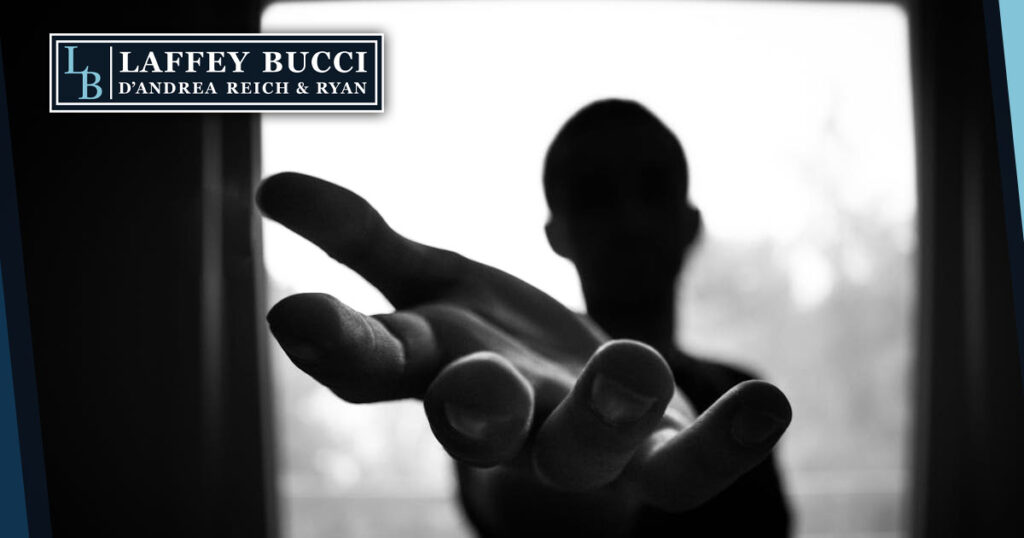No matter what type of crime is committed, there will be a victim. It is especially heinous when the victims are the most vulnerable in society. The U.S. Department of Homeland Security describes human trafficking as the “use of force, fraud, or coercion to obtain some type of labor or commercial sex act.”
Human trafficking is a crime, and it takes courage and support for a victim to break out of the cycle and find help.
The attorneys at Laffey Bucci D’Andrea Reich & Ryan have been providing that exact kind of help.
As experienced sex trafficking victim lawyers, we work in coordination with local authorities to help our clients get out from under the oppression of their traffickers.
While the Philadelphia District Attorney’s office pursues criminal charges, we can explore options to hold the trafficker accountable and seek fair compensation. No amount of money can make up for the physical and emotional pain inflicted by a trafficker. But that compensation can help the victim start over and rebuild their life.
Who is at Risk?
It is common to think of human trafficking involving victims being brought from overseas and exploited. However, this category of crime can apply to any person who is coerced into work or a sexual act for money, regardless of their age or where they were born.
Recently, 22 people were charged in connection with a Philadelphia human trafficking ring. As reported by CBS News, the alleged traffickers prey upon local women who were living in halfway houses and struggling with substance abuse. Human traffickers are insidious in targeting their victims. They know who is the most vulnerable.
Typically, the victims will have an unstable living situation. Teenage victims could be runaways or already in trouble with the juvenile justice system. They might be struggling with drug and alcohol abuse or living in a home where the parents have substance abuse issues.
They could also be undocumented immigrants who are being forced to work off a debt to their trafficker.
Red Flag Signs of a Human Trafficking Victim
Not every victim of human trafficking is kept locked up. You might encounter someone who is caught up in the throes of this crime by recognizing the following red flag signs:
- Showing signs of physical injuries, such as bruising or cuts
- Avoiding eye contact and interaction
- Appearing destitute without personal possessions
- Living at their place of employment
- Overall poor physical and dental health.
- Minors working in a restaurant
- Not allowed to go into a public space alone
- Provides “rehearsed” answers to common questions
If you encounter someone who seems isolated, scared, and involved in a strenuous work situation, you might be right to suspect something else is going on.
How to Report Human Trafficking
You might encounter someone you think is being trafficked. Whoever is holding control over them won’t be far away. While your instinct might be to remove that person from their situation, that is not something you should take on. The better approach would be to contact the authorities. Here is who you can call:
National Human Trafficking Hotline
The National Human Trafficking Hotline is a 24/7 confidential calling center that can be reached at 1-888-373-7888. In addition to the hotline, the website offers resources for victims.
Department of Homeland Security
The Department of Homeland Security has created the Blue Campaign, which focuses on human trafficking. Their website offers resources to help identify the victims of trafficking and provides ways to report the issue.
Healthy Minds Philly
The Healthy Minds Philly website lists numerous human trafficking resources for reporting and providing shelter for the victims.
Holding Traffickers Accountable
It is essential to provide support for the victims of human trafficking. You don’t have to provide a home for them, but you can alert the authorities and share the resources with the person who can help. There might also be an opportunity to hold the traffickers and others at fault accountable.
Recently, three women who were the victims of sex trafficking were awarded $17.1 million from the owners of three hotels where the crimes occurred. The abuse went on for years, and the hotels failed to provide adequate security or proper training for their employees to recognize the crime.
The attorneys at Laffey Bucci D’Andrea Reich & Ryan have helped victims find a financial remedy for what they went through. It is important to prosecute the traffickers to the full extent of the law and make sure they pay restitution.
Call to discuss the options today.

